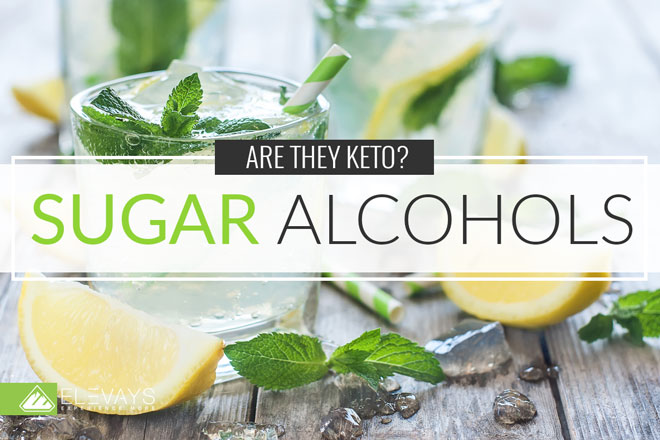The short answer is that yes, sugar alcohols can be keto. But some are definitely better choices than others. This article is going to put you in the know on which sugar alcohols are keto approved and which ones are not. Continue reading for details on how to choose the sweetener that’s right for you.
I will admit, in the beginning of my keto journey I was exactly where you might be. Dazed and confused about whether sugar alternatives were allowed. I knew that sugar was all carbs and that keto was low-carb, high-fat—but with that, how would I incorporate beloved desserts into my keto lifestyle?
I’m a huge sucker for all things sweet (plus I love baking) so if you’re looking for a way to satisfy your sweet tooth then you’ve come to the right place. There’s a lot of confusion on whether sugar alcohols are keto approved or not and since not all sugar alcohols are created equally, it’s important to know which ones to opt for when that sweet craving arises.
What are Sugar Alcohols?
Let’s start with what sugar alcohols are. Disclaimer: they won’t get you drunk so don’t tell your kids that those cookies in the jar are for adults only. Or do. If they’re really that good.
Sugar alcohols (polyols) fall under the carbohydrate category. These sweet carbohydrates are hybrids of sugar molecules and alcohol molecules. While most are found naturally in plants and berries, a lot of the time the ones you commonly see in “diet” and “sugar-free” foods are highly refined and processed from glucose in corn starch (1). Since US labeling laws permit manufacturers to stamp products containing polyols as “sugar-free” and “no-added sugar”, many consumers are under the impression that their blood sugar won’t rise and that they aren’t consuming any carbs. So, while sugar alcohols can sometimes be the much better choice for diabetics and people trying to lose weight, all sugar alcohols work differently.
For keto crew members, ditching sugar is a must so read on to find out which sugar alcohol is the best for your keto lifestyle.
Do Sugar Alcohols Impact Carbs And Net Carbs?
Sugar alcohols are carbohydrates that are not fully digested by our bodies. Fiber is a type of plant carbohydrate that is also indigestible. That’s why when we calculate net carbs we subtract total carbohydrates by grams of fiber (net carbs=total carbohydrates-grams of fiber). To stay in ketosis, you should aim to eat between 20-30 grams of net carbs per day.
Since sugar alcohols are either partially or completely indigestible by the human body, I get asked a lot whether someone should count sugar alcohols towards their daily net carb intake. Because some sugar alcohols impact glucose levels, they should be calculated in (especially if you consume a large amount).
How To Calculate Net Carbs And Sugar Alcohols
Sugar alcohols that don’t count toward net carbs are erythritol, xylitol, mannitol, and lactitol. This is because they have a minimal (if at all) spike in blood sugar. You’ll discover below that the only keto approved sugar alcohols we recommend are erythritol and xylitol (2).
If you are incorporating other sugar alcohols (I do not recommend these) like maltitol, isomalt, sorbitol into your keto diet, calculate them this way:
Each gram of the sugar alcohols listed below has roughly a ½ gram of carbohydrates. For every gram of the sugar alcohol, divide by 2 and add it to your net carb count (2).
Net carbs=total carbs-fiber-sugar alcohols + (isomalt/2)
Sugar Alcohols, separating the good from the bad
Is Xylitol Keto?
You’ve probably been strolling through your natural grocery store and saw a “good for your gums” chewing gum that had XYLITOL written across it or maybe you’ve turned over a can of all-natural mints and saw it on the ingredient list. Xylitol is super common in sugar-free gums, candies, oral care products, and diabetic friendly foods. This sugar alcohol is considered natural because small amounts can be found in many fruits and vegetables. Fun fact: we humans even produce tiny amounts of it by means of a healthy metabolism!
Since it has a comparable sweetness to real sugar (but with 40% fewer calories) it’s a perfect substitution for people trying to lose weight and people with diabetes. And this is because it won’t spike blood sugar.
Xylitol can make for a stellar sugar substitute for these 2 reasons:
1. Won’t spike blood sugar
Unlike other sugar alcohols, xylitol is a good guy when it comes to insulin release. Xylitol contains zero fructose and does not raise blood sugar (3). Real sugar has a glycemic index of 60-70 while xylitol has a glycemic index of only 7.
People who struggle with obesity, prediabetes or diabetes should consider xylitol as an alternative. A study done on rats showed that xylitol can prevent weight gain, decrease belly fat, and reduce symptoms of diabetes (4).
2. Starves bad bacteria and feeds good bacteria
You could’ve guessed that xylitol has some serious dental health benefits because of its prominence in dental care products but do you know why? Studies prove that xylitol has super powers when it comes to preventing tooth decay (5). Bad oral bacteria feeds on glucose but can’t use xylitol. When the harmful bacteria fills up on xylitol, it has no room left for glucose and basically experiences death by clogging. That’s why it’s good to chew xylitol gum. In a study where subjects chewed xylitol sweetened chewing gum, bad bacteria levels decreased by 27-75% while it had no recorded effect on good bacteria (6).
Xylitol is also considered a prebiotic fiber- and this is where the good bacteria comes in. It works like a soluble fiber and helps feed good gut bacteria (7). Get yourself some xylitol sweetened chewing gum and clog those harmful bacteria and feed those good guys!
There is an unfortunate downside to xylitol though. Some have reported gastric distress due to its laxative effect. If used sparingly (don’t get too crazy with your keto desserts) then you are unlikely to experience this.
The other downside to xylitol is that the vast majority is derived from corn… and it’s usually not organic corn. Since corn is at the top of the list of genetically modified foods to avoid (10) you would be wise to look for xylitol sourced from Birch wood. It still has the same benefits of corn-derived xylitol but without the GMOs.
Is Erythritol Keto?
Erythritol is also on the yes list. With 6% of the calories of regular sugar and 70% of the sweetness, erythritol makes for a great sugar alternative. Like xylitol, erythritol won’t raise insulin levels due to its unique chemical structure. Since our bodies can’t break this polyol down (we don’t have the enzymes for it) our blood sugar will stay stable.
This means that erythritol goes straight to our bloodstream and is then excreted in our urine, unchanged. We have also seen no effect on triglycerides or cholesterol so we’re a huge fan of this sugar alcohol (8).
You might have thought that xylitol is your mouth’s personal super hero but after a 3-year study done of 485 school children, researchers found that erythritol was more protective against cavities than xylitol (9).
Bottom line, erythritol is keto approved and could work well for keeping your mouth healthy and your blood sugar levels stable. Add it to any of your keto desserts or try out this keto molten lava cake made with erythritol!
Is Maltitol Keto?
We’re going to say maltitol is a no go for keto. Maltitol is the most comparable to real sugar. With a very similar mouth feel and taste, maltitol is 90% as sweet but with half of the calories. That sounds great and all but maltitol has high absorption and spikes blood sugar (GI of 36-53).
Don’t be fooled when you see foods that claim to be “sugar-free” but have maltitol in the ingredient list. To your body—sugar is sugar and maltitol has the same effect.
If you have pre-diabetes or diabetes, be sure to monitor your blood sugar carefully when consuming “sugar-free” or “low-carb” products that contain maltitol, or just skip them all together. So while maltitol may be categorized as a safer choice than sugar, there are also some reports of stomach pains and gas. Depending on your body, maltitol can act as a laxative and lead to diarrhea (10).
We don’t need any of those nasty side effects after we blow out the candles on our keto approved birthday cake so maltitol is a no go.
Is Sorbitol Keto?
Sorbitol is another sugar alcohol you may be familiar with. Found in a lot of toothpaste, mouthwash and chewing gum, sorbitol leaves your mouth with a fresh feel. But kind of weird for desserts (unless you’re going for that). With 60% of the sweetness but only 2/3 of the calories, sorbitol has a mild impact on your blood sugar levels.
While it could be a good option for keto—it’s not our first. Due to its strong laxative effect, sorbitol can cause bloating, gas, and severe diarrhea (11).
Is Isomalt Keto?
Isomalt is a sugar alcohol that is not keto and should be avoided. It has half the calories and half the sweetness of sugar. While it doesn’t have a terrible effect on dental health and doesn’t raise blood sugar significantly– it can be detrimental for gastrointestinal tract health.
Is Aspartame Keto?
Aspartame is one of the most talked about artificial sweeteners: having tons of recorded potential risks, it is one of the worst you can ingest. Amino acids in aspartame go straight into the bloodstream bypassing enzyme breakdown.
You’ll find aspartame in diet sodas, sugar-free products like cereal, yogurt, and flavored waters, laxatives, and appetite suppressants. While this might make it seem like aspartame is a diet’s best friend– it actually works against your weight loss goals. Aspartame has also been shown to increase risk of heart disease and weight gain.
Other risks include: cancer, heart disease, diabetes, brain disorders, fibromyalgia, kidney disorders, premature menstruation, and autism. So if it’s not obvious already, aspartame is a definite no for keto–and just in general (11).
Is Dextrose Keto?
No! Dextrose is mostly made from GMO corn. Which is its first strike. Its second strike is that it significantly increases blood sugar levels (12). Like I mentioned earlier– that is the last thing we want for keto (or just in general). Dextrose is found in a lot of the carbs you eat which may be the reason why you can’t lose weight. You should avoid dextrose always.
Is Maltodextrin Keto?
Just like dextrose, maltodextrin is known to raise blood sugar levels. Maltodextrin is not only not keto, but it is also not healthy! Maltodextrin is highly processed and usually made from poor sources of corn, wheat, and rice. Corn and wheat are some of the worst sources of GMO foods. For a healthy diet- we know to avoid all things that are processed and maltodextrin is one of them.
What’s the best sugar alcohol for keto?
Results are in. First runner up is xylitol! And the gold goes to erythritol!! Both erythritol and xylitol passed the keto test making these sugar alcohols the most keto friendly!
- No effect on insulin level or other biomarkers (cholesterol, blood pressure, triglycerides)
- No side effects when consumed properly at sensible doses
- Has been found safe at recommended dose
Try making these super fudgy cocoa brownies or another keto dessert and leave a comment below letting me know how you liked it!
Sources:
- Wu, Brian. “Alcohol and Diabetes: Alcohol Effects, Blood Sugar Levels, Guidelines.” Medical News Today, MediLexicon International, 26 Apr. 2017, www.medicalnewstoday.com/articles/312918.php.
- Brooks, Spencer. “How to Calculate Net Carbs on Keto — and Why They Matter.” Bulletproof, Bulletproof, 19 Sept. 2018, blog.bulletproof.com/how-to-calculate-net-carbs-keto/.
- The University of Sydney, (2017). Xylitol. Retrieved from: http://www.glycemicindex.com/foodSearch.php?num=2481&ak=detail
- Islam, M. S., & Indrajit, M. (2012). Effects of xylitol on blood glucose, glucose tolerance, serum insulin and lipid profile in a type 2 diabetes model of rats. Annals of Nutrition and Metabolism, 61(1), 57-64.
- Council on Clinical Affairs, (2015). Policy on the Use of Xylitol. Retrieved from: http://www.aapd.org/media/Policies_Guidelines/P_Xylitol.pdf
- Bahador, A. B. B. A. S., Lesan, S., & Kashi, N. (2012). Effect of xylitol on cariogenic and beneficial oral streptococci: a randomized, double-blind crossover trial. Iranian journal of microbiology, 4(2), 75.
- Salminen, S., Salminen, E., Koivistoinen, P., Bridges, J., & Marks, V. (1985). Gut microflora interactions with xylitol in the mouse, rat and man. Food and chemical toxicology, 23(11), 985-990.
- Noda, K., Nakayama, K., & Oku, T. (1994). Serum glucose and insulin levels and erythritol balance after oral administration of erythritol in healthy subjects. European journal of clinical nutrition, 48(4), 286-292
- Honkala, S., Runnel, R., Saag, M., Olak, J., Nõmmela, R., Russak, S., & Honkala, E. (2014). Effect of erythritol and xylitol on dental caries prevention in children. Caries research, 48(5), 482-490.
- “How To Make Your Keto Diet Sweeter.” Keto Summit, 21 Dec. 2018, ketosummit.com/are-sugar-alcohols-keto.
- Edwards, Rebekah. “Aspartame Side Effects: Avoid This Common Food Additive.” Dr. Axe, Dr. Axe, 21 Sept. 2018, draxe.com/aspartame/.
- John. “Complete Guide To Sweeteners on a Low-Carb Ketogenic Diet | KetoDiet Blog.” KetoDiet, KetoDietApp.com, 6 Dec. 2018, ketodietapp.com/Blog/lchf/Top-10-Natural-Low-carb-Sweeteners.
- “Top 10 Worst GMO Foods.” Organic.Org, 28 January 2019, https://organic.org/top-10-worst-gmo-foods/.









Thanks for these tips!
Hi there! You’re welcome. Glad you found them helpful!
I can handle the small amount of xylitol in gum – but MUST avoid the erythritol and maltitol!!
What they do to the intestines is VERRY painful and inconvenient!! I am far from the only one!
I thought it was the law that sugar alcohols were always to be listed in the info on packags but sometimes you have to search and be knowledgeable.
Elaine, everyone is different and some are super sensitive! Thanks for pointing that out. It’s also so important to check labels on everything, always. Glad you know what your body can handle and that you’re vigilant with knowing what’s going in it!